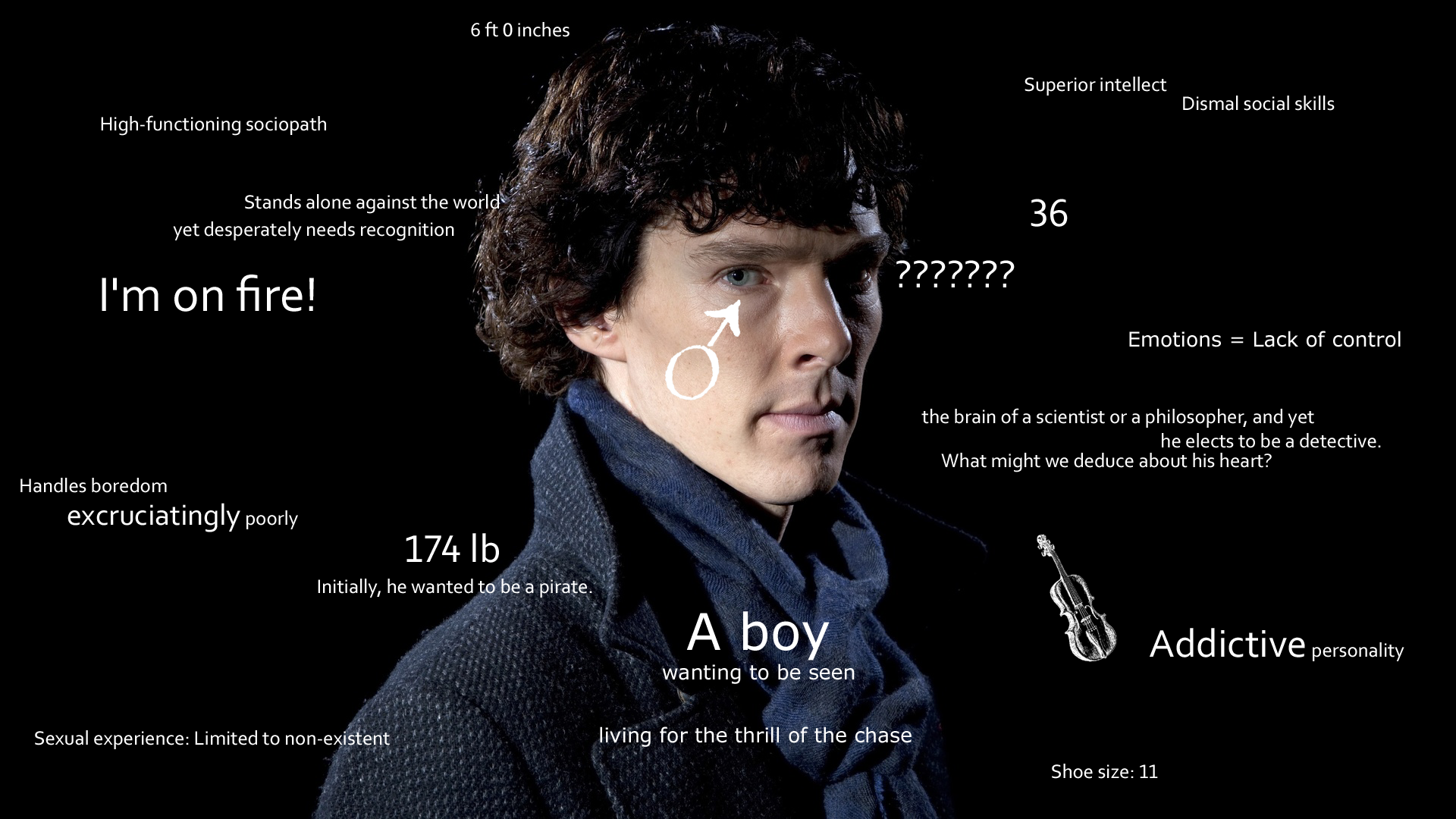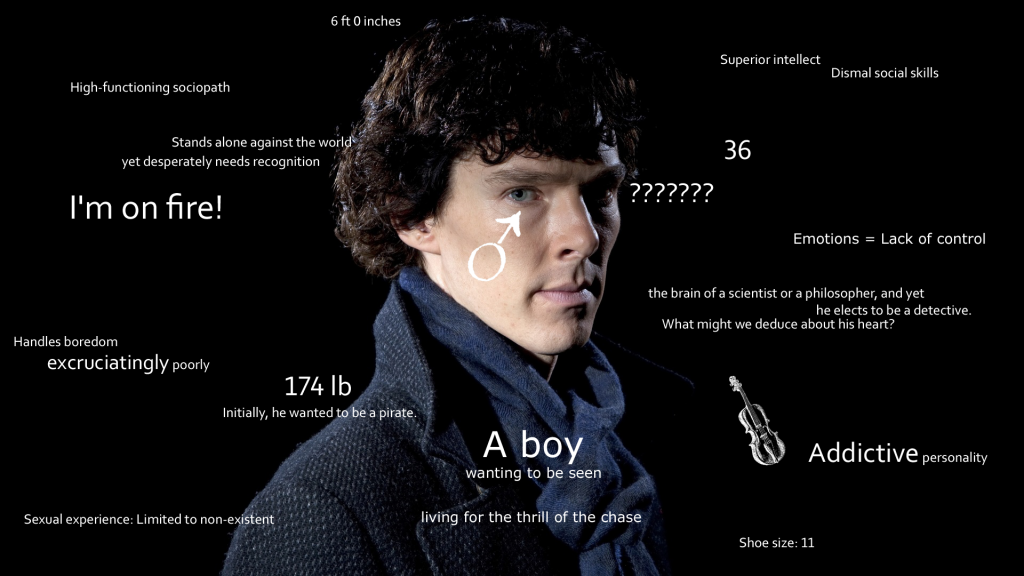I am currently enrolled in the online learning course The Future of Storytelling at iversity.org. Every week there’s an assignment, and this week we were told to portray our favourite character from a TV series with whom we connect emotionally. My choice fell on Benedict Cumberbatch’s portrayal of Sherlock in the new BBC TV Series.I am currently enrolled in the online learning course The Future of Storytelling at iversity.org. Every week there’s an assignment, and this week we were told to portray our favourite character from a TV series with whom we connect emotionally. My choice fell on Benedict Cumberbatch’s portrayal of Sherlock in the new BBC TV Series.
 I have always had a strong connection to Sherlock (Holmes). When I was 11, I read the entire Sherlock Holmes Omnibus from back to back, giving my English writing a decidedly Victorian tint. As the astute reader has already observed, I was the class nerd/geek. In every break, I used to wander the school grounds alone, making soliloquies in my head, compensating for my lack of social skills and my longing for connection by putting on a front of arrogant aloofness, firmly believing that I was somehow better than the commonwealth. That I didn’t need anybody.
I have always had a strong connection to Sherlock (Holmes). When I was 11, I read the entire Sherlock Holmes Omnibus from back to back, giving my English writing a decidedly Victorian tint. As the astute reader has already observed, I was the class nerd/geek. In every break, I used to wander the school grounds alone, making soliloquies in my head, compensating for my lack of social skills and my longing for connection by putting on a front of arrogant aloofness, firmly believing that I was somehow better than the commonwealth. That I didn’t need anybody.
Conan Doyle’s original character, The 19th Century Sherlock, was an addictive and socially inept personality with a massive intellect. Cumberbatch’s 21st Century Sherlock takes this a step further, introducing us to an intensely insecure man with the heart of a boy, whose cockiness and sociopathic tendencies pushes people away. To control his world he hides in a fortress of his own impressive intellect where he is king, and where he makes the rules, but what he doesn’t allow himself to understand, is the fact that he is extremely dependent on the recognition and admiration of others.
What makes him so endearing, is the fact that we observe him trying to grasp the importance of friendship, and that we see him gradually realize his need for connection and support with/from his friends as the series go on, even though this is alien territory to him. No wonder that I connect to this character, with regards to my own history. When watching Sherlock, I connect to the boy within me, that insecure and unbalanced boy who desperately longs for companionship, yet doesn’t know how, who protects himself by escaping into the reality within. Who shields his vulnerability with arrogance.
Now, as a grown man, looking back on my childhood, I am grateful. Without that sense of disconnection, of being cut off from the world at large, I would never have developed my connection with my imagination to such a degree. And without that, I wouldn’t be working with the best (for me, at least) profession in the world. And now, whenever I start the work with a new performance, a new story, whenever I have to dive into the collective unconscious to pick jewels from the ocean floor, I feel the same feeling I presume Sherlock feels whenever a new and mysterious case lands in his lap. A tingling of the spine, a rush of adrenaline, a sense of great wonder and challenge. And a desire to say, out loud, with a smile:
The game is on.
 I have always had a strong connection to Sherlock (Holmes). When I was 11, I read the entire Sherlock Holmes Omnibus from back to back, giving my English writing a decidedly Victorian tint. As the astute reader has already observed, I was the class nerd/geek. In every break, I used to wander the school grounds alone, making soliloquies in my head, compensating for my lack of social skills and my longing for connection by putting on a front of arrogant aloofness, firmly believing that I was somehow better than the commonwealth. That I didn’t need anybody.
I have always had a strong connection to Sherlock (Holmes). When I was 11, I read the entire Sherlock Holmes Omnibus from back to back, giving my English writing a decidedly Victorian tint. As the astute reader has already observed, I was the class nerd/geek. In every break, I used to wander the school grounds alone, making soliloquies in my head, compensating for my lack of social skills and my longing for connection by putting on a front of arrogant aloofness, firmly believing that I was somehow better than the commonwealth. That I didn’t need anybody.
Conan Doyle’s original character, The 19th Century Sherlock, was an addictive and socially inept personality with a massive intellect. Cumberbatch’s 21st Century Sherlock takes this a step further, introducing us to an intensely insecure man with the heart of a boy, whose cockiness and sociopathic tendencies pushes people away. To control his world he hides in a fortress of his own impressive intellect where he is king, and where he makes the rules, but what he doesn’t allow himself to understand, is the fact that he is extremely dependent on the recognition and admiration of others.
What makes him so endearing, is the fact that we observe him trying to grasp the importance of friendship, and that we see him gradually realize his need for connection and support with/from his friends as the series go on, even though this is alien territory to him. No wonder that I connect to this character, with regards to my own history. When watching Sherlock, I connect to the boy within me, that insecure and unbalanced boy who desperately longs for companionship, yet doesn’t know how, who protects himself by escaping into the reality within. Who shields his vulnerability with arrogance.
Now, as a grown man, looking back on my childhood, I am grateful. Without that sense of disconnection, of being cut off from the world at large, I would never have developed my connection with my imagination to such a degree. And without that, I wouldn’t be working with the best (for me, at least) profession in the world. And now, whenever I start the work with a new performance, a new story, whenever I have to dive into the collective unconscious to pick jewels from the ocean floor, I feel the same feeling I presume Sherlock feels whenever a new and mysterious case lands in his lap. A tingling of the spine, a rush of adrenaline, a sense of great wonder and challenge. And a desire to say, out loud, with a smile:
The game is on.




Legg igjen en kommentar